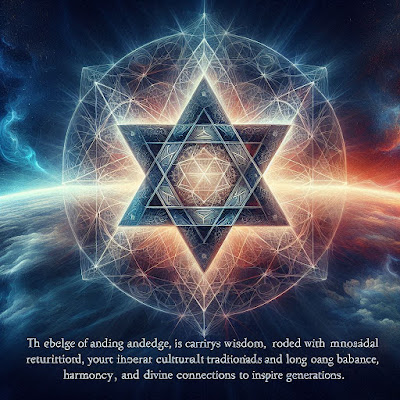Activating Change: The Power of Will and Neurochemistry in Personal Transformation
Exploring the Intersection of Divine Will, Human Conscience, and the Brain’s Chemistry
The concept of will is fundamental to personal transformation, yet its true nature is often misunderstood. To better grasp this idea, we can explore both the divine will and human will, each with unique characteristics. While divine will is tied to immediate creation and invention, human will is associated with moral conscience and neurochemical processes. Together, they form the framework through which we engage in ethical and spiritual growth.
Divine Will vs. Human Will: A Deep Dive into Islamic Thought
In Islamic philosophy, a key distinction is made between the divine will of Allah and human will. This distinction is clarified in a narration found in Tafseer Hub-e-Ali and Noor al-Thaqalayn. Imam Ja'far al-Sadiq (AS) explains that the will of Allah is an act of creation—immediate and unmediated—where His command is an instantaneous action, as expressed in the Quranic verse:
“Say to it: Be, and it becomes” (36:82-83). This highlights the nature of divine will as absolute, requiring no deliberation, speech, or mood. Allah’s will is not like human thought or speculation; it is invention, not an outcome of external factors.
In contrast, the will of human beings is linked to our moral conscience. As Imam Ali (AS) states in Nahj al-Balagha, while Allah's will is an inherent, autonomous act of creation, the human will operates within a framework of thought, deliberation, and ethical reflection. Human beings engage in moral reasoning—shaped by emotional states and values—before deciding to act. This human will is an ongoing process of self-awareness and moral guidance.
Neurochemistry of Will: Understanding the Brain’s Role
To fully understand the nature of human will, we must look to the brain's chemistry. The limbic system—responsible for regulating emotions—and the prefrontal cortex, which governs decision-making, play pivotal roles in our moral reasoning and willful actions. Neurotransmitters like dopamine and serotonin influence how we act in the world, affecting everything from our pursuit of rewards to our social behaviors.
Dopamine, for instance, is the brain’s chemical messenger that governs reward and motivation, driving us to achieve our goals.
Serotonin and oxytocin, on the other hand, are responsible for social bonding, empathy, and emotional regulation. These hormones help us connect with others and align our actions with ethical and spiritual values.
The activation of these neurochemicals through activities such as mindfulness, meditation, or prayer enables individuals to reshape their moral conscience. Just as Jihad al-Nafs (the struggle against the self) emphasizes internal reform, the neurochemical process of activating certain brain regions through reflection and spiritual engagement aids in personal transformation.
A Deeper Understanding: Rewriting the Brain’s Programs
However, the transformation is not merely the result of passive reflection or engagement. It is much deeper and more literal. Mental and moral shifts cannot be solely attributed to passive reflection or spiritual engagement—they require a conscious reprogramming of the brain. For any meaningful change to occur, old, limiting mental programs must first be "unwritten" before new, healthier programs can be actively written into the brain’s circuitry.
This understanding moves beyond metaphor into the realm of the literal: Just as a computer must be reprogrammed to function differently, the brain must also undergo a process of rewiring. This process can be achieved through Islamic practices like recitation and reflection, not just as forms of spiritual engagement, but as tools for direct cognitive and emotional restructuring. When we recite certain prayers or verses, particularly in the original Arabic, we do more than repeat words—we activate specific brain regions linked to emotion, moral reasoning, and self-regulation.
Adding to this, the act of writing becomes a critical tool in this transformation. Writing these prayers or affirmations—both in Arabic and English—creates a powerful feedback loop in the brain. Writing has a profound cognitive impact, influencing neural pathways and allowing for more effective and enduring neuroplastic change. This is because writing engages the brain’s motor functions and requires deeper mental processing than mere recitation, thus creating stronger and more sustainable neural connections. Through writing, we initiate immediate cognitive shifts and literally rewrite the thought patterns that govern our behavior.
Bridging Divine and Human Will: A Path to Transformation
The relationship between divine will and human will is not just theological but also deeply connected to personal growth. When we understand that the divine will is a direct, unmediated force of creation, we realize that human will operates within a more complex, slower process—affected by reflection, emotions, and the body’s chemistry. However, both forms of will lead to change and transformation.
Incorporating a deeper understanding of neurochemistry and moral conscience into our spiritual practices allows us to activate the necessary pathways for transformation. Spiritual practices like prayer, meditation, and self-reflection not only align our actions with divine will but also trigger the activation of specific brain chemicals that enhance our moral and emotional states.
This concept is not just about exerting mental willpower but about learning how to activate and direct the brain’s chemistry toward positive transformation. As we engage with our internal processes and strive for ethical action, we unlock the potential for spiritual growth and moral clarity.
Conclusion: The Continuous Journey of Self-Reformation
Transformation is a dynamic process that goes beyond mere intellectual effort or willpower. By understanding how divine will and human will intersect within our moral conscience and neurochemistry, we realize that change is a holistic process. It involves both spiritual engagement and the activation of the brain's neurochemical pathways.
Ultimately, as we engage with practices that encourage reflection, self-awareness, and ethical decision-making, we activate the necessary neural and moral pathways that lead to lasting transformation. This process aligns our human will with divine intent, shaping our actions and guiding us on a continuous path of moral and spiritual reform.







Comments
Post a Comment